
Bill Connelly, ESPN Staff WriterDec 28, 2024, 10:02 AM
- Bill Connelly is a staff writer for ESPN.com.
It is perhaps symbolic that, as he approaches his 500th match in charge at Manchester City on Sunday, Pep Guardiola is being confronted with so many problems that he hasn't faced since the very beginning of his tenure. He is completing a circle of sorts.
Guardiola's first City team in 2016-17 was a bit of a mess. Of the 22 players who saw at least 700 minutes in all competitions that season, 12 were at least 30 years old and five were 22 or younger. Midfielder Kevin De Bruyne, 25, was brilliant and nearing his prime while a pair of 28-year-olds, forward Sergio Agüero and defender Nicolás Otamendi, were stellar. But the squad itself had been allowed to grow stale before Guardiola's arrival, and expensive (and young) recent additions like Raheem Sterling, John Stones and Leroy Sané were still maturing, needing time to adjust to Guardiola's demands.
City enjoyed plenty of high points that season -- a nine-match winning streak to start the Guardiola era, a 3-1 thumping of Barcelona in the Champions League, an eight-match unbeaten streak to end the campaign -- but they finished 15 points behind Premier League champions Chelsea and bowed out to AS Monaco in the Champions League round of 16. Near the end of the season, Guardiola said that either of his previous clubs (Barcelona or Bayern Munich) would have fired him for his performance, and while that was almost certainly not true, it reflected the disappointment plenty felt.
Now, after 499 matches, City's current problems seem awfully familiar. Of the 19 players who have recorded at least 600 minutes in all competitions in 2024-25, 11 are 29 or older, four are 22 or under and only four -- forward Erling Haaland, midfielders Phil Foden and Matheus Nunes and defender Rúben Dias -- are close to what you might call the prime age range. (Foden, Nunes and Dias have all missed time with injury, too.) Injury and staleness have helped to derail a season that has seen some high notes and a 14-match unbeaten streak to start the season, and once again, Guardiola has spoken unrealistically of getting fired.
Guardiola and City approach match No. 500 in their worst ever form together, and with what is expected to be an active January transfer window approaching, the squad could soon feel almost as new as the 2016-17 iteration. But 500 matches is an incredible milestone all the same, and it's a really interesting moment to step back and take a look at Guardiola's first 499 matches -- and 354 wins -- in charge.

THE TROPHY CASE
Sir Alex Ferguson is the modern standard for trophies. He won 38 of them in 27 seasons at Manchester United, including 13 Premier League titles and two Champions Leagues. Guardiola has won half the trophies in only one-third of the time. Through nine seasons, Ferguson had reeled in only nine trophies; by the nine-year mark, Arsenal's Arsene Wenger had won 11 of his eventual 17. Guardiola's haul of 18 nearly matches the two of them combined and, by my count, matches the trophy haul in City's first 115 years of existence (minus second-division titles).
Guardiola trophies by season
2016-17: none
2017-18: Premier League, League Cup
2018-19: Premier League, FA Cup, League Cup, Community Shield
2019-20: League Cup, Community Shield
2020-21: Premier League, League Cup
2021-22: Premier League
2022-23: Premier League, FA Cup, Champions League
2023-24: Premier League, FIFA Club World Cup, UEFA Super Cup
2024-25: Community Shield*
(*Man City have been eliminated from the League Cup in 2024-25, but the FA Cup, Champions League and, technically, Premier League are still within reach.)
That's six Premier League titles, four League Cups, two FA Cups, three Community Shields and one Champions League title -- plus the UEFA Super Cup and FIFA Club World Cup titles that tend to come with it. Obviously every accomplishment of this era comes with a storm cloud overhead in the form of the 115 charges of financial wrongdoing lobbied against the club, but however his squad was put together, Guardiola went out and engineered more wins with it than anyone else ever has in 499 matches.
The trophy count almost undersells it: Only 12 teams in the history of the Premier League have recorded more than 90 points in a season, and four of them were City teams from the past seven years. Only one team has ever hit 100 points, and it's a City team (2017-18).

THE ALL-PEP TEAM
If we look at the players most associated with Guardiola's City teams, we get both reminders of greatness and hints for how and why City's recent downturn took place.
The 16,000-minute club
Eleven players have recorded more than 16,000 minutes for Guardiola at City.
- Éderson, GK: 31,177 minutes
- Bernardo Silva, MF/FW: 26,702 mins
- Kevin De Bruyne, MF: 26,367 mins
- Kyle Walker, DF: 25,626 mins
- Ilkay Gündogan, MF: 22,704 mins
- Raheem Sterling, FW: 22,072 mins
- Rodri, MF: 20,555 mins
- John Stones, DF: 20,036 mins
- Fernandinho, MF: 18,216 mins
- Phil Foden, MF/FW: 18,092 mins
- Rúben Dias, DF: 16,356 mins
Of these 11, nine (in bold) are still with the club. Five of these nine are at least 30 years old, three are at least 33, and six were added in just a 13-month span: Gündogan (from Borussia Dortmund, July 2016), Stones (Everton, August 2016), Éderson (Benfica, July 2017), Silva (Monaco, July 2017), Walker (Tottenham Hotspur, July 2017) and Foden (Man City academy, July 2017).
When Rodri tore his ACL in September, City had already brought Gündogan back from Barcelona. This is an incredibly accomplished and talented group of players -- that summer 2017 haul ranks among the greatest a club has ever put together -- but the fact that they're still being asked to play major roles has to be considered worrisome. De Bruyne has become increasingly injury prone of late, and both Gündogan and Walker have slowed noticeably. That's what happens when you approach your mid-30s with a million miles on the odometer.
The All-Pep lineup
Here are the players who have recorded the most minutes at a given position for Guardiola. Again, players still on the team are in bold:
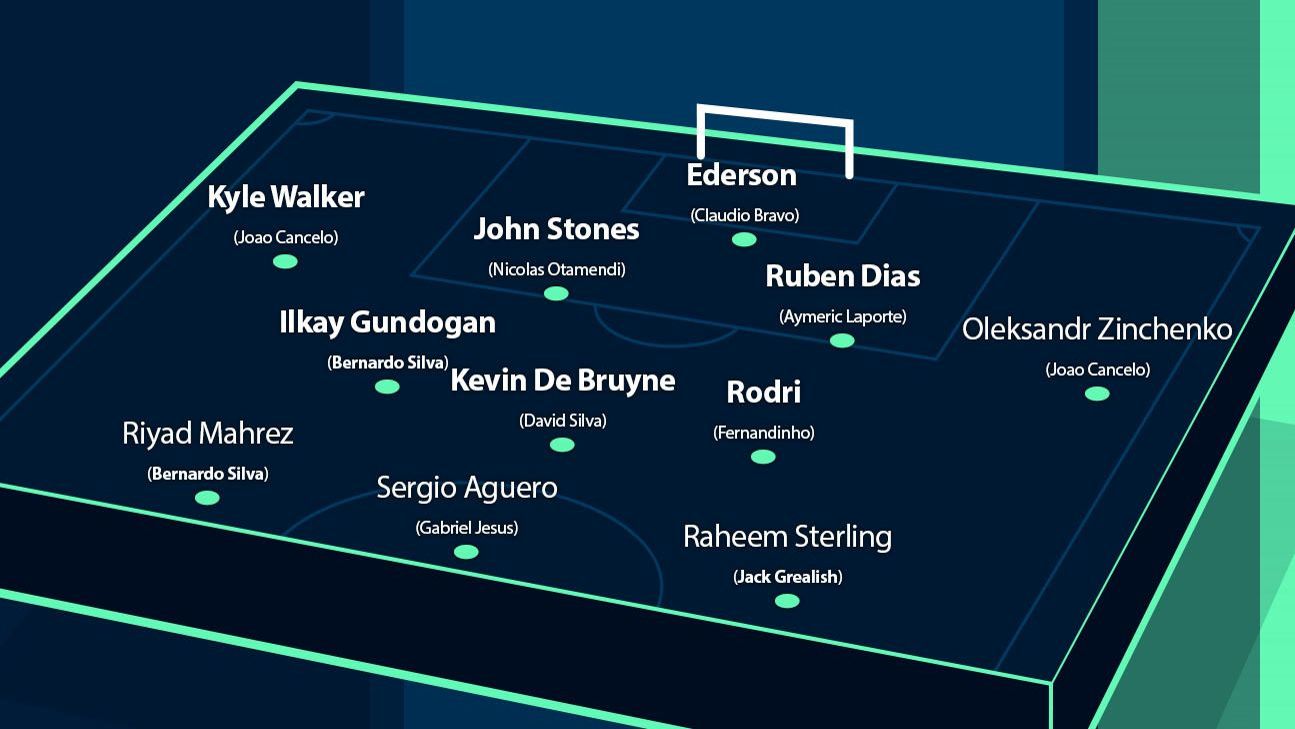
City have done a solid job of renewing the squad up top, with Haaland now leading the attack, but Guardiola has been leaning on the same players in midfield and defense for quite a while. He also has benefited from a couple of incredible jack-of-all-trades stars in Silva and Foden. Silva has recorded at least 1,300 minutes as a central midfielder, defensive midfielder, right winger, right midfielder, center-forward, left winger and central attacking midfielder; Foden has recorded at least 500 minutes as a central midfielder, left winger, right winger, center-forward, left midfielder and right midfielder. Guardiola keeps a pretty tight rotation when he can manage it, and certain players' versatility has benefited him significantly.
Defensive depth was tested by a run of recent injuries, but Dias is only 27, 20-year-old Rico Lewis is establishing himself and overall depth is solid. In the midfield, however, City haven't made nearly as many moves and haven't struck it big with the ones they've made. After Rodri's brilliant addition in 2019-20, they spent a combined €140 million in transfer fees on Kalvin Phillips, Mateo Kovacic and Nunes; the former never caught on and has been loaned out, most recently to Ipswich Town, while the latter two have been fine but less than spectacular. And even with Silva and Foden, depth has proven far from sufficient.
Statistical leaders
Here are the players who have recorded the highest totals in key statistical categories:
GOALS: Sergio Agüero 124, Raheem Sterling 120, Erling Haaland 108
ASSISTS: Kevin De Bruyne 152, Bernardo Silva 69, Raheem Sterling 66
CHANCES CREATED: Kevin De Bruyne 994, Bernardo Silva 557, Raheem Sterling 451
PASS COMPLETIONS: Rodri 20,066, Kyle Walker 18,841, Ilkay Gündogan 17,012
1v1s: Raheem Sterling 1,205, Bernardo Silva 849, Kevin De Bruyne 776
DEFENSIVE INTERVENTIONS: Rodri 3,186, Kyle Walker 2,880, Fernandinho 2,837
At center-forward, City have successfully moved on from Agüero and Gabriel Jesus (the fourth-leading scorer for Guardiola) and into the Haaland era, but in the attacking midfield and wing roles, the transition to a new generation has stalled. Sterling departed in 2022 and Riyad Mahrez in 2023, with youngsters Cole Palmer and Julián Álvarez both seeking employment elsewhere as well. Meanwhile, City laid down a whopping €117.5m transfer fee for Jack Grealish in 2021 and then spent another €85m in fees on Jérémy Doku (2023) and Savinho (2024). Grealish has had his moments, and Doku seems like Sterling's 1-vs.-1s successor, but they've lacked in terms of goal contributions.
1:17
The key reason for Manchester City's falloff
Bill Connelly joins "The Football Reporters" to explain what the statistics show about Manchester City's decline.
As a result, City have continued to lean on De Bruyne (when healthy) and Silva. De Bruyne has more than twice as many assists and nearly twice as many chances created as any other Guardiola player, and Silva is second in both categories. Even this season, having played just 807 minutes in all competitions due to injuries and, as of late, a bench role, De Bruyne is still fifth on the team with 30 chances created. Silva, of course, is first.

HOW THE PREMIER LEAGUE HAS CHANGED
Guardiola's impact on City has been undeniable. Even with heavy investment from the Abu Dhabi United Group starting in 2008, eight years before his arrival, City didn't become City until Guardiola took over. That said, his impact on the Premier League itself is almost as noticeable and might be just as heavy over the long term.
(*Direct speed: the average number of meters per second that teams advance the ball up the pitch in a given sequence.)
It's overly simplistic to attribute a full league's trends to one coach. Among other things, stats like shots per possession, percentage of shots taken within the defensive box and percentage of possessions starting in the attacking third have all increased as well -- trends we're seeing throughout the sport due to the influence of other coaches (Jürgen Klopp and the Red Bull school, perhaps) and analytics. Still, it isn't a coincidence that the Premier League as a whole has taken on so many of the characteristics of one particularly dominant team (Guardiola's City).
It also might not be a coincidence that said team began to struggle the most this season when those league-wide trends picked up speed. Total possession numbers have dropped by nearly as much in the past two years as they did over Guardiola's first seven seasons, while pass completion rates have risen by even more in that span. Counterattacking and directness, as measured by Stats Perform, have become far less desirable, and more teams are attempting to engineer slow buildup from the back.
Tactics have become more sophisticated, too -- we see teams attempting to bait opponents into pressing in specific situations now, and they are better at playing through the press -- and City's relatively predictable formation and buildup patterns generate far fewer advantages. When the roster is old, thin and banged up, of course, those advantages dissipate even further.
Still, even accounting for recent trends, City remain the standard when it comes to pragmatic buildup and pass volume.
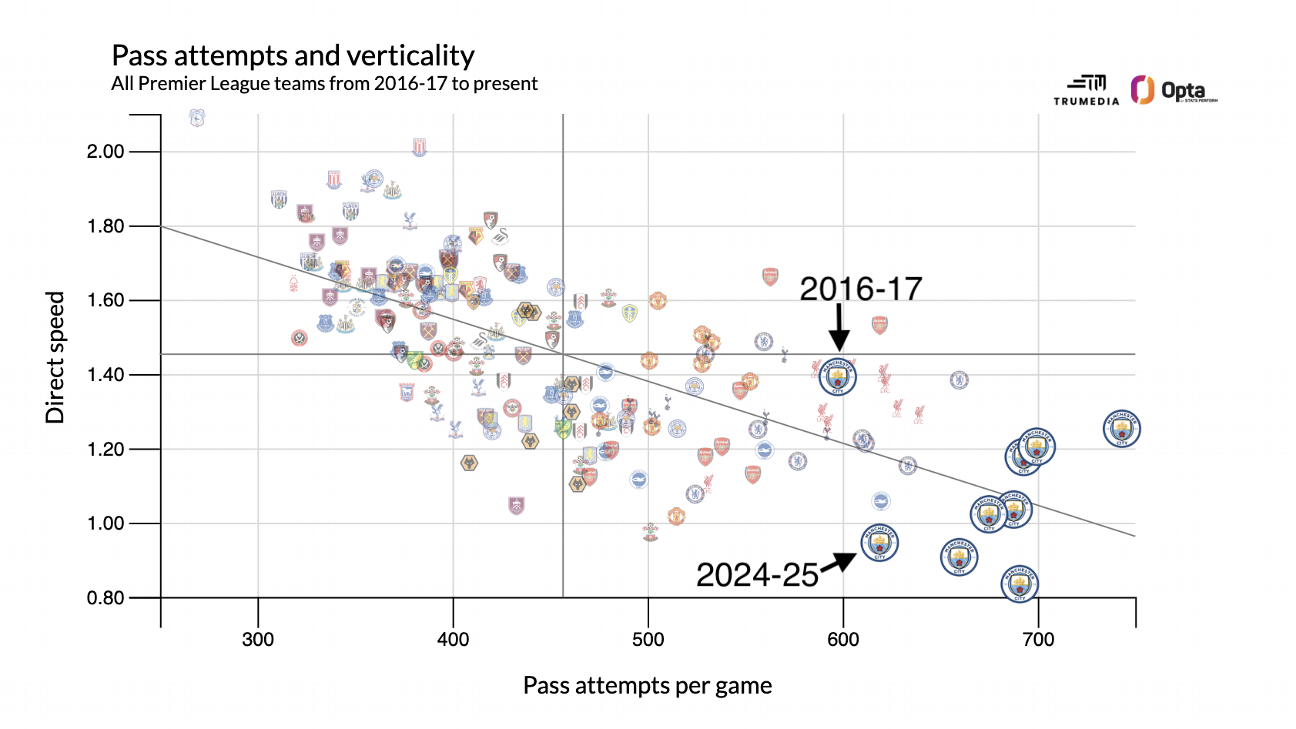
Even with other teams becoming less and less direct, City have the lowest direct speed in the Premier League. Meanwhile, City's current possession totals are shockingly low, even by City standards.
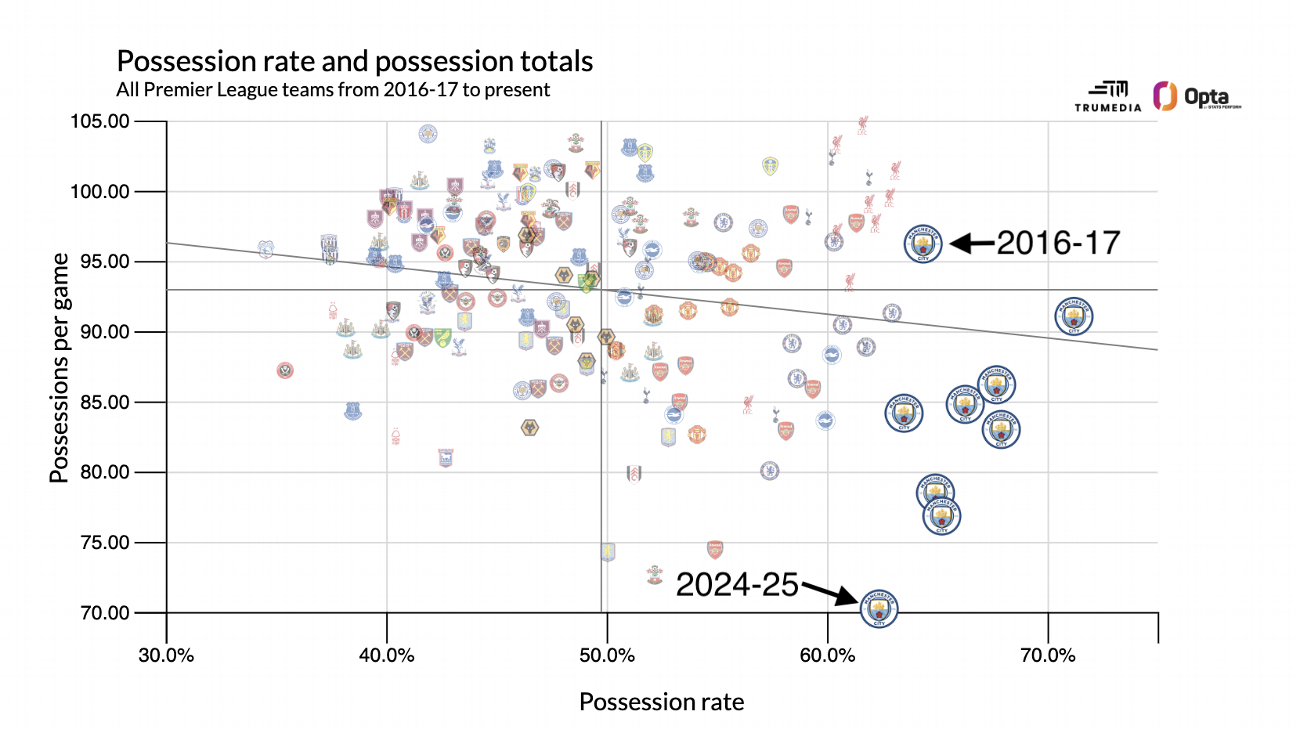
There's long been a joke that, when something goes wrong for the control-hungry Guardiola, his response is to try to assert even more control. It's fitting, then, that of the 42 City matches that have featured less than 70 total City possessions under Guardiola, 12 have come in the first half of this season and seven have come in the past two months. The tempo is coming down in England, and it's coming down even further in Manchester.
So are City's point totals.

CITY ARE PLUMMETING
A team's form waxes and wanes even for massively successful managers, and heading into 2024-25, Guardiola and City had dealt with some occasionally bumpy patches.
- 2016-17 (Sept. 28 to Dec. 10): 15 matches, four wins, 18 points (1.20 per game)
- 2016-17 (March 8 to April 30): 14 matches, three wins, 14 points (1.27 per game)
- 2019-20 (Nov. 10 to Dec. 7): six matches, two wins, eight points (1.33 per game)
- 2020-21 and 2021-22 (May 8 to Aug. 15): seven matches, two wins, six points (0.86 per game)
That 2019-20 spell was brief but costly: City fell from six points behind Liverpool to 14 back in the last title race they didn't win. But the worst spells by far came in Guardiola's first season as he was still figuring out what he had and what he needed. It's worth noting that even including the first season, Guardiola and City had encountered nothing close to the struggles through which they're currently working.
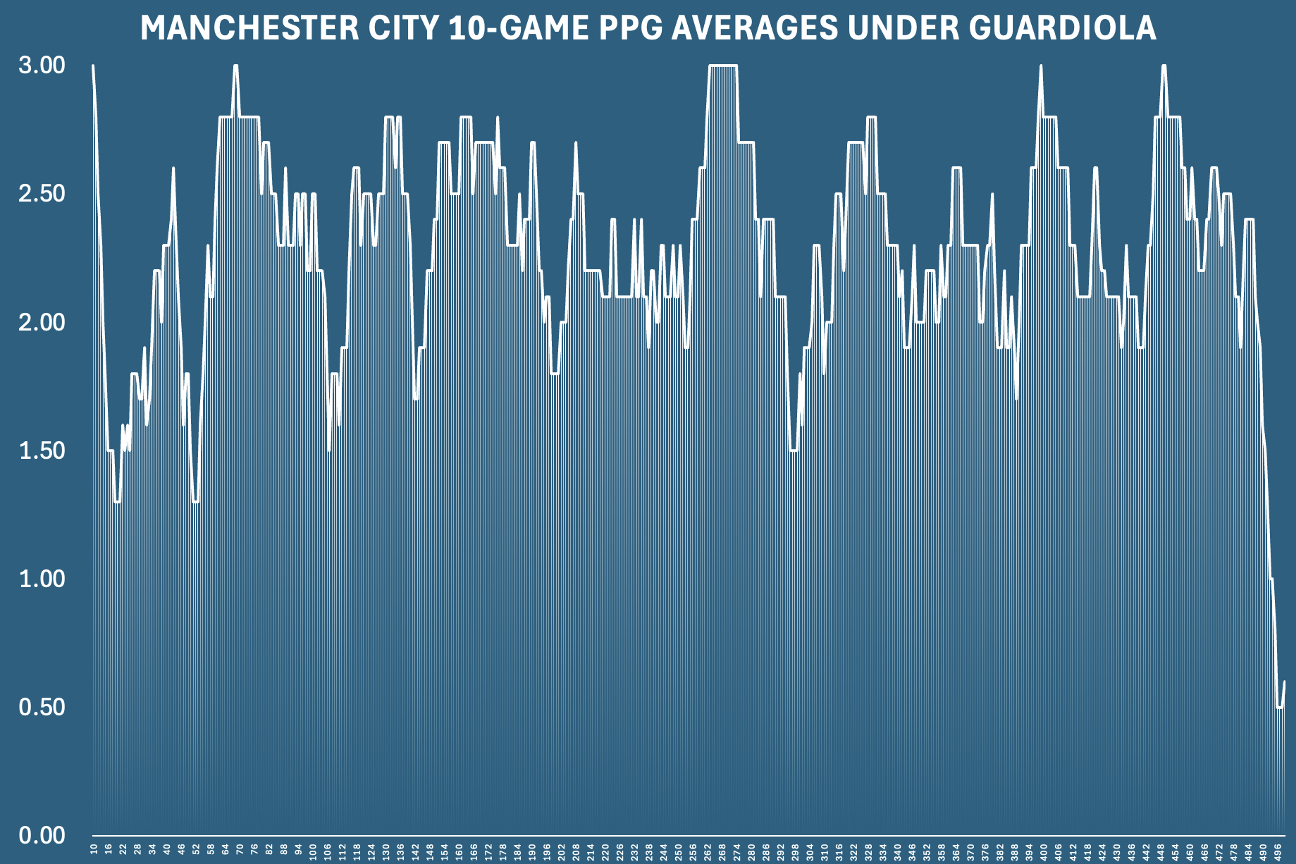 (Source: Bill Connelly)
(Source: Bill Connelly)
Man City's 1-0 win over Southampton on Oct. 26 was their fifth in a row in all competitions and extended a 14-match unbeaten start to the season. They were the last remaining team without defeat in the Premier League, and they were two points ahead of a torrid Liverpool atop the table. Everything was extremely normal in Pep Land.
The past two months have been a horror show. They've played 13 matches and won only one, an old-school 3-0 throttling of Nottingham Forest on Dec. 4. They've pulled just six points from these 13 matches, by far their worst stretch under Guardiola. It got so bad that Thursday's disappointing draw with Everton actually raised their 10-game average point total from 0.5 to 0.6.
What exactly has gone wrong? We can answer that with another chart showing Man City's 10-game averages (xG and xGA) under Guardiola.
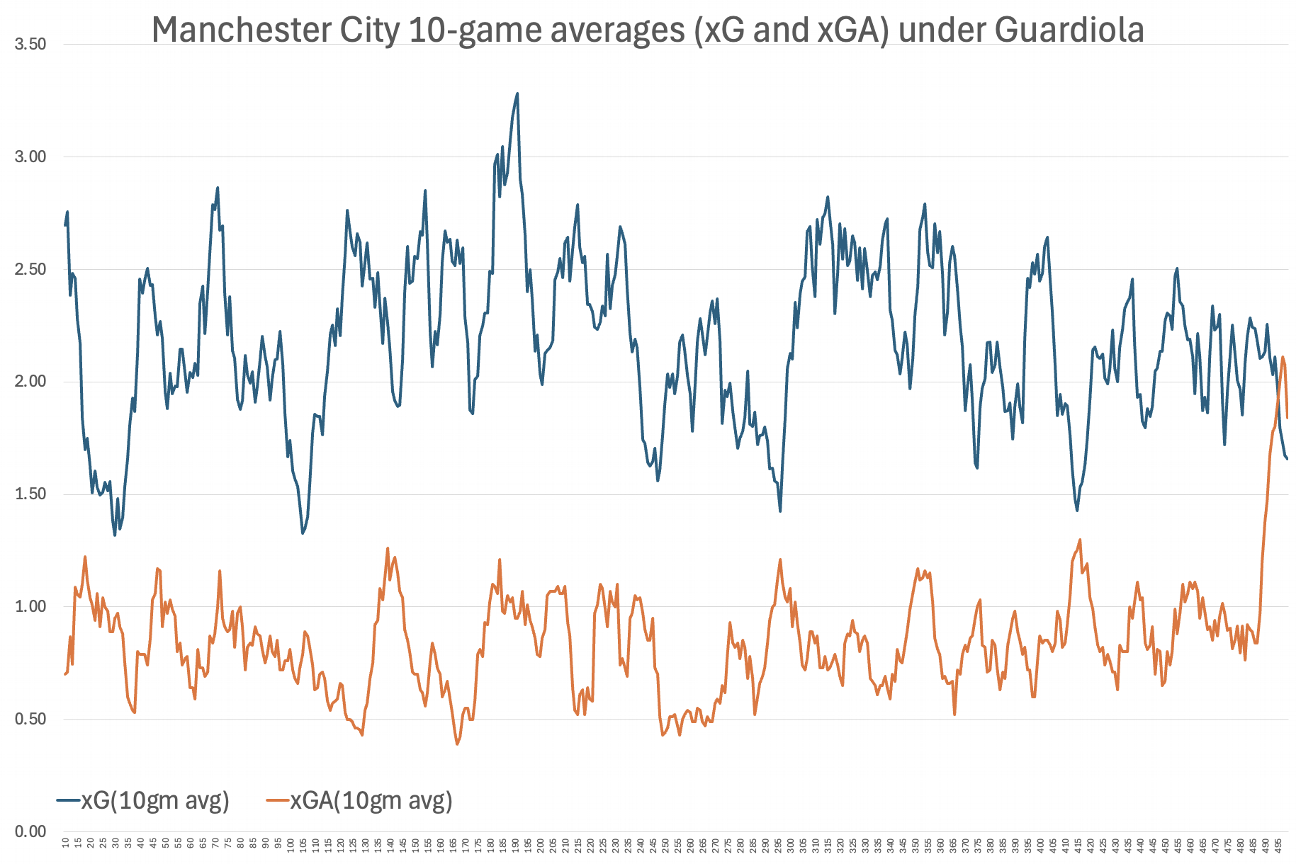 (Source: Bill Connelly / StatsPerform)
(Source: Bill Connelly / StatsPerform)
Looking at the quality of chances City have created and allowed, we see that while the attack is in a bit of a low ebb, it is still within what you might call City's normal range. Their reliance on Haaland has backfired as he has dealt with a finishing funk -- during this dire 13-match run, he has scored only four goals from shots worth 9.2 xG (including a missed penalty against Everton) -- but that will right itself.
The defense, however, has disintegrated. Previously, the worst defensive spell of the Pep era came at the end of the 2022-23 season and the beginning of 2023-24, when City allowed shots worth a total of 15.4 xG over 13 matches. They allowed shots worth 15.6 xG in just six matches from Nov. 2 to Dec. 1. And remember: This has unfolded while City matches were featuring the lowest total possessions ever.
When City have struggled defensively in the past, it usually has come from bumpy transition defense and the high-quality shots that result from it. City have allowed under 0.08 shots per possession in every Guardiola season to date, but sometimes the average shot quality has ended up a little too high. It's what has separated some of the absolute greatest Guardiola teams from the merely outstanding ones.
In 2024-25, however, City are allowing more shots than ever. They're also allowing just about the most high-quality shots we've ever seen.
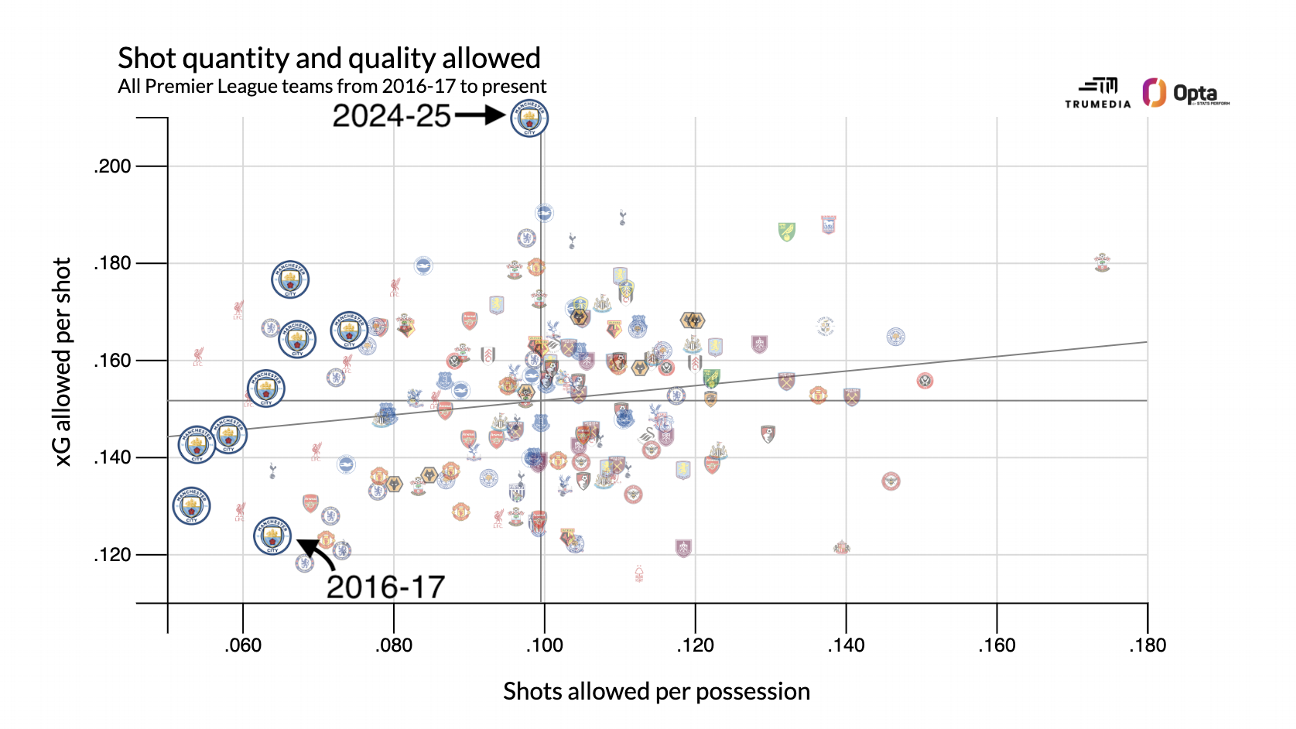
(Source: TruMedia)
Over the past nine seasons, no one has come anywhere close to the 0.22 xG per shot that City are currently allowing, and this has bled over into their Champions League form as well: After outscoring their first three UEFA opponents by a combined 9-0, they've been outscored 9-4 in their past three matches. They have dropped to 22nd in the 36-team Champions League table, just one point away from the elimination line.
What's gone wrong?
From a macro level, a little bit of everything. Opponents are creating fewer high turnovers than ever against City, but they are also scoring twice as many goals from high turnovers: the breakdowns aren't breakdowns, they're catastrophes. Opponents are also attempting fewer counterattacks than ever (7.7 per game, second fewest in the Premier League) but are generating higher shot quality than ever (City have allowed 5.3 xG from counters, most in the league). City are allowing great chances from sudden attacks, as in Villa's first goal last weekend.
— NBC Sports Soccer (@NBCSportsSoccer) December 21, 2024They're also allowing inexcusably high-quality chances from slow, pragmatic possessions, such as Everton's goal on Thursday.
— NBC Sports Soccer (@NBCSportsSoccer) December 26, 2024Defensively, City are worse at almost everything. From a micro level, however, we can also boil a lot of City's troubles down to a single player's absence.
It's frankly delightful that Guardiola created an entire system of play that makes the position he played, the classic defensive midfield/single pivot role, the single most important role on the pitch. When City have what they need from that role -- namely from Fernandinho over most of Guardiola's first four seasons, then from Rodri in the next four -- everything works. When they don't have what they need there, however, it's like discovering the Death Star's strangely overlooked vulnerability.
When City set the Premier League points record in 2017-18, Fernandinho did everything, ranking third in the league in pass completions (2,679), third in progressive passes (403), third in progressive carries (423) and 23rd in ball recoveries (207). When Rodri was playing at a Ballon d'Or level in 2023-24, he ranked first in the league in pass completions (3,359), second in progressive carries (2459), first in progressive passes (521) and second in ball recoveries (235). He also ranked 21st in combined goals and assists (17), which is frankly unfair.
In Rodri's absence, Guardiola has played a number of guys in the pivot role, from veterans like Kovacic and Gündogan to Lewis and, on a couple of occasions, even Silva. Kovacic has done a majority of the work there, but he's currently 15th in the league in pass completions (911), 24th in progressive carries (131), 28th in progressive passes (103) and 104th in ball recoveries (52). He has three goals and no assists. He is a reliable ball-control presence, but he plays like one person; Rodri was basically two. Combine that with issues elsewhere at midfield -- Gündogan's aging, Foden's and De Bruyne's injuries, Silva being able to play only one position at any given time -- and you get a midfield that doesn't create quite as much in attack and at times vanishes in defense.
The easy comparison for City's troubles is Liverpool's 2020-21 campaign, which was derailed both by a marquee ACL injury (Virgil van Dijk) and a number of other defensive injuries as well.
Liverpool got consistently carved up in transition and allowed at least three goals six times in all competitions. But they still finished the season having allowed just 1.11 Premier League goals per match (City are currently allowing 1.44), and their worst stretch was a run of 12 points in 12 matches. They didn't let their poor domestic form impact their Champions League situation, either: They won their Champions League group and easily disposed of RB Leipzig in the round of 16 during their worst run of play. That struggle was similar, but it didn't reach depths this low.
2:00
Ogden questions where Guardiola's innovation has gone
Mark Ogdens says Pep Guardiola is showing no signs of coming up with a solution to Manchester City's current run of poor form.
There are two ways to look at City's season as a whole. On one hand, it's all but guaranteed to end up their worst since Guardiola's debut campaign. They trail league leaders Liverpool by 14 points despite having played one more match. According to Opta, they entered Thursday's action with just a 76% chance of finishing in the top four, and a 91% chance of advancing to the Champions League knockout rounds. Most teams would love those odds, but anything less than 100% in both categories is jarringly deficient for Guardiola and Manchester City.
On the other hand, 76% and 91% are indeed still good odds. Unless their ongoing trial against the Premier League results in particularly punitive punishment, they're still likely to land in a pretty comfortable position in the table and play Champions League ball next season.
If better player health and a productive January transfer window prompt improvement, making runs in the FA Cup and Champions League remain a distinct possibility. Hell, if you look at the xG/xGA chart again above, you'll see that City's defensive form might already have begun to rebound.
From a wider angle, it was almost refreshing to see that even a monolith can be affected by poor form and confidence. City lost their composure against Feyenoord in the Champions League, making simple mistakes and looking like a team that had simply forgotten how to manage a game while blowing a 3-0 lead. Even on Thursday against Everton, Haaland had a timid penalty saved by Jordan Pickford.
You do all the little, important things so well for so long, and it almost seems like it's easy. It's not, even for a Pep Guardiola team. And honestly, their recent struggles -- and the ease with which things went from good to bad -- almost make their seven years of sustained success even more impressive. When it's that easy to lose your way, it's amazing that they didn't do it for so long.
Four-hundred ninety-nine matches ago, Pep Guardiola had plenty of skeptics wondering if he could dominate a deep and competitive league and adapt his style to fit the opposition he was facing. Now, as match No. 500 approaches, it's almost the same story.
He proved those doubters hilariously wrong once. Will he do it again?
 (1).png)
 6 days ago
3
6 days ago
3












